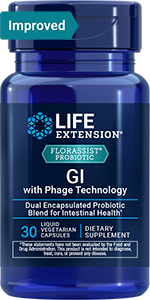
Newsletter
Newsletter
CoQ10 and selenium associated with longer telomeres

Readers of Life Extension Update may recall a previous issue of the Update that reported the finding of a lower risk of cardiovascular disease mortality among participants in a 4-year trial who received a combination of coenzyme Q10 (CoQ10) and the mineral selenium, compared to a placebo. Participants in this study had low selenium levels at baseline, and these values were corrected by the end of the study.
In a new sub-study, participants in the trial who received the combo were found to have longer telomeres, which were associated with a lower risk of cardiovascular disease mortality compared to shorter telomeres.1
Telomeres are the genetic material that caps the ends of our cells’ chromosomes. Telomeres shorten during the aging of the cell—a process known as telomere attrition. Shorter telomeres have been associated with a greater risk of cardiovascular disease and premature mortality.
“The main finding in our study was that…combined selenium and coenzyme Q10 for 42 months prevented telomere attrition in an elderly Swedish population low in selenium,” authors Trine Baur Opstad and colleagues reported. “Those who died a cardiovascular death during 6 years of follow-up after completion of the study at 48 months presented with shorter leukocyte telomere length as measured at 42 months compared to survivors.”
The current investigation was a sub-study of a trial that compared the effects of four years of intake of 200 milligrams CoQ10 plus 200 micrograms selenium to a placebo in men and women aged 70 to 88 years upon enrollment.2 The original trial found less than half the risk of mortality from cardiovascular disease among the group that received CoQ10 and selenium than the placebo group (5.9% vs 12.6%). A protective effect in association with these nutrients persisted 12 years after the trial’s conclusion.3
The sub-study included 118 participants from the original trial. Blood samples collected upon enrollment and at 42 months were analyzed for white blood cell telomere length. While telomere length was similar on average between the groups at the beginning of the study, participants who received a placebo showed a decline at 42 months, while telomere length remained relatively unchanged in the group that received CoQ10 and selenium. Participants who died from cardiovascular disease during follow-up had shorter telomeres at 42 months compared with those who survived.
The findings were reported on August 15, 2022, in the journal Nutrients.1
Products
Apply What You've Learned: CoQ10 and selenium
- Coenzyme Q10 (CoQ10) and selenium are antioxidant nutrients. Selenium, like all minerals, must be obtained in the diet. Although the body makes CoQ10 and it is contained in some foods, it’s hard to get optimal levels naturally—making adding it to a health regimen a good choice for many.
- The combination of CoQ10 and selenium has been the subject of numerous investigations. In addition to longer telomeres and a lower risk of mortality from cardiovascular disease, these nutrients have been linked to improvements in kidney function, blood viscosity, glycation, endothelial function, inflammation, cardiovascular health and more.4-9
- There may be an extra benefit to consuming selenium with vitamin E compared with consuming selenium alone.10
- To optimize CoQ10 absorption, take it with food that contains fat or oil.11
References
- Opstad TB et al. Nutrients. 2022 Aug 15;14(16):3346.
- Alehagen U et al. Int J Cardiol. 2013 Sep 1;167(5):1860-6.
- Alehagen U et al. PLoS One. 2018 Apr 11;13(4):e0193120.
- Alehagen U et al. Nutrients. 2020 Dec 9;12(12):3780.
- Alehagen U et al. Nutrients. 2020 Dec 9;12(12):3780.
- Alehagen U et al. J Trace Elem Med Biol. 2020 May 4;61:126541.
- Alehagen U et al. Eur J Nutr. 2020 Dec;59(8):3581-3590.
- Alehagen U et al. J Inflamm (Lond). 2019 Mar 18;16:5.
- Alehagen U et al. Int J Cardiol. 2013 Sep 1;167(5):1860-6.
- Saini R. J Pharm Bioallied Sci. 2011 Jul-Sep; 3(3): 466–467.
- Zu K et al. Cancer Res. 2003 Oct 15;63(20):6988-95.
Featured Life Extension Magazine® Article
Dr. James Kirkland: The Senolytics Revolution
By Michael Downey
Senolytics are compounds that have an ability to induce the death of senescent cells: old, toxic cells that ought to undergo a process of self-destruction and then be cleared by the immune system. Yet, rather than self-destroying, these toxic senescent cells persist, secreting damaging proinflammatory factors in the tissue that surrounds them as well as into general circulation.
Dr. James Kirkland and other researchers believe that senescent cell accumulation is an important factor in aging and the development of disease. In a review published in the journal Nature Medicine, Dr. Kirkland explained the rationale for targeting senescent cells to treat disorders across the lifespan. Senolytic compounds being evaluated include the nutrients quercetin, theaflavins, and fisetin, and the drug dasatinib.
Read Full Article
What's Hot
Health Concern
Higher CoQ10 levels linked with improved physical capacity, reduced cardiovascular risk among older individuals
A study published on January 29, 2022 in Antioxidants found lower levels of blood factors related to cardiovascular disease and greater physical capacity and among participants with higher plasma levels of coenzyme Q10 (CoQ10), a factor in the production of energy within the mitochondria of the cells.

Atherosclerosis and Cardiovascular Disease
Comprehensive blood testing helps identify and target specific risk factors, targeting a treatment regimen that can be used to preserve and improve cardiovascular health.
Related Life Extension Magazine® Articles

CoQ10 And Selenium Reduce Cardiovascular Death
Cardiovascular deaths were reduced by 50% in older adults taking selenium and CoQ10 supplements.

Why I Recommend CoQ10 For My Patients
Dr. Joel Kahn tells Life Extension® how coenzyme Q10 helps cardiac patients prevent heart failure, heart attacks, and other cardiovascular issues.
Life Extension Magazine® Issue Now Online
A remarkable number of healthy-longevity findings have been published over the past 18 months.




